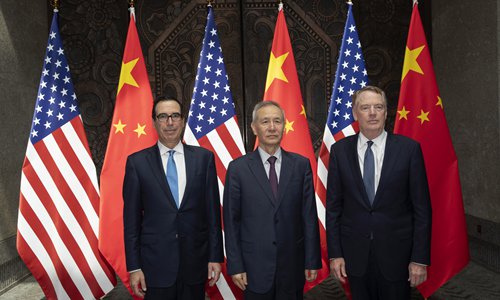HOME >> BUSINESS
Experts dismiss negative media reports about phase one deal
By Wang Cong Source:Global Times Published: 2019/11/25 20:13:42 Last Updated: 2019/11/25 23:27:02
‘Broad consensus reached, differences remain on tariffs’

Chinese Vice Premier Liu He (center), US Trade Representative Robert Lighthizer (right) and US Treasury Secretary Steven Mnuchin pose for a photo before holding talks at the Xijiao Conference Center in Shanghai on July 31. Chinese and US negotiators met in Shanghai in a bid to bring an end to a year-long trade war. Photo: IC
Contrary to some media reports suggesting China and the US are struggling to reach a trade deal, the two sides are still moving closer to agreeing on a phase one trade agreement with broad consensus having been reached, despite differences over the scale of tariff removals, according to Chinese experts close to the government.
"The two sides have basically reached broad consensus for the phase one agreement," Gao Lingyun, an expert at the Chinese Academy of Social Sciences in Beijing who is close to the trade talks, told the Global Times, noting that the two sides are still moving closer to reaching a phase one deal soon, unlike the "contradictory information" in media reports.
Gao further noted that the two sides have even agreed to roll back tariffs as part of the phase one deal, but there were different opinions over which tariffs should be removed or to what degree the tariffs should be lowered.
Gao's comments were in line with Chinese officials' long-standing stance concerning the trade talks: China wants a deal, but a fair and balanced one.
Geng Shuang, a spokesperson for the Chinese Ministry of Foreign Affairs, on Monday reiterated that the two sides have maintained close contact and China hopes "both sides could find a solution acceptable on the basis of equality and mutual respect." However, Geng referred questions about the progress of the phase one deal to the Ministry of Commerce.
On Thursday, Gao Feng, a spokesperson for the Commerce Ministry, said that "China is willing to work with the US to address each other's core concerns properly and strive for a phase one agreement on the basis of equality and mutual respect."
As talks dragged on after a plan to sign the deal in mid-November on the sidelines of the APEC summit did not materialize due to Chile's withdrawal as host of the event, speculation followed about the fate of the deal, and several media reports suggested that the two sides were nowhere close to a deal.
"As of now, China and the US remain relatively optimistic about reaching a phase one trade agreement… though it has taken more time than expected," Song Guoyou, director of the Fudan University center for economic diplomacy in Shanghai, told the Global Times, noting both sides have the "consensus and need" to reach a deal soon.
Different phases
Song said if they cannot find common ground but still want to reach a deal, the two countries could leave some areas of dispute for talks in later phases. "This should be a continuous process," he said.
Gao also suggested that the two sides could divide the negotiations into different phases, addressing easier issues first and leaving thornier issues for later phases. "In the early phases, the two countries could find more common ground. The challenge could be the last phase, where the two sides might have very different views," he said.
Such an arrangement could also allow time for China to pursue its long-stated goals to further expand its market opening and carry out reforms to address structural issues, experts noted.
Chinese officials have long said that China will continue to open its market and improve its business environment, but China - not outside forces - will determine the direction and pace of its reforms. Beijing has announced measures to open its market and has vowed to enhance protection of foreign investments through a new Foreign Investment Law set to be implemented on January 1 next year.
On Sunday, China issued a directive calling for intensified protection of intellectual property rights (IPR), aiming to effectively curb infringements by 2022 and addressing the high costs and low compensation for companies seeking to safeguard their rights, Xinhua reported.
Liu He, China's vice premier and head of the Chinese negotiating team, on Friday also called for adherence and improvements to China's socialist economic system in an article published by the People's Daily, the flagship newspaper of the Communist Party of China.
In the article, Liu also called for improved IPR protection, market reforms and fairer competition.
Posted in: ECONOMY